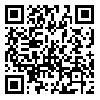Research code: نویسندگان متعهد می شوند کد اخلاق تا زمان چاپ به نشریه ا�
Ethics code: IR.SSRC.REC.1402.321
Clinical trials code: نویسندگان متعهد می شوند کد اخلاق تا زمان چاپ به نشریه ا�
Department of Motor Behavior and Sport Psychology, Science and Research Branch, Islamic Azad University, Tehran, Iran , keivannorozy@gmail.com
Abstract: (1369 Views)
Background & Aims: The purpose of this study was to investigate the effectiveness of a session of coach, mirror and self-control observation on learning the movement sequence of form movements using Kinect sensor evaluation.
Methods: The number of 30 novice women and 30 skilled women in form movements with the age range of 18 to 30 were selected as available and each category was randomly divided into three groups of 10 people: direct observation of the coach, observation of the coach in the mirror, self-control observation. The exercises consisted of a one-hour training session of new form movements from Kinect's set of rhythmic movements, which were taught to the participants by three methods: direct observation, mirror and self-control. The evaluation of the performance of the movement sequence in the stages of acquisition, acquisition, retention, and follow-up was evaluated through the Kinect sensor (highest score = 100).
Results: The results showed that all groups showed the significant acquisition (M > 50; P ≤ 0.05) and their performance in retention and follow-up tests was maintained (P > 0.05). Skilled groups performed significantly better than novice groups (P≤0.05). Also, the self-control groups performed better in all stages of evaluation than other groups (P≤0.05).
Conclusion: Therefore, self-control of observation exercises improves learning a new movement sequence in form movement learners.
Methods: The number of 30 novice women and 30 skilled women in form movements with the age range of 18 to 30 were selected as available and each category was randomly divided into three groups of 10 people: direct observation of the coach, observation of the coach in the mirror, self-control observation. The exercises consisted of a one-hour training session of new form movements from Kinect's set of rhythmic movements, which were taught to the participants by three methods: direct observation, mirror and self-control. The evaluation of the performance of the movement sequence in the stages of acquisition, acquisition, retention, and follow-up was evaluated through the Kinect sensor (highest score = 100).
Results: The results showed that all groups showed the significant acquisition (M > 50; P ≤ 0.05) and their performance in retention and follow-up tests was maintained (P > 0.05). Skilled groups performed significantly better than novice groups (P≤0.05). Also, the self-control groups performed better in all stages of evaluation than other groups (P≤0.05).
Conclusion: Therefore, self-control of observation exercises improves learning a new movement sequence in form movement learners.
Type of Study: Research |
Subject:
Exercise Physiology



